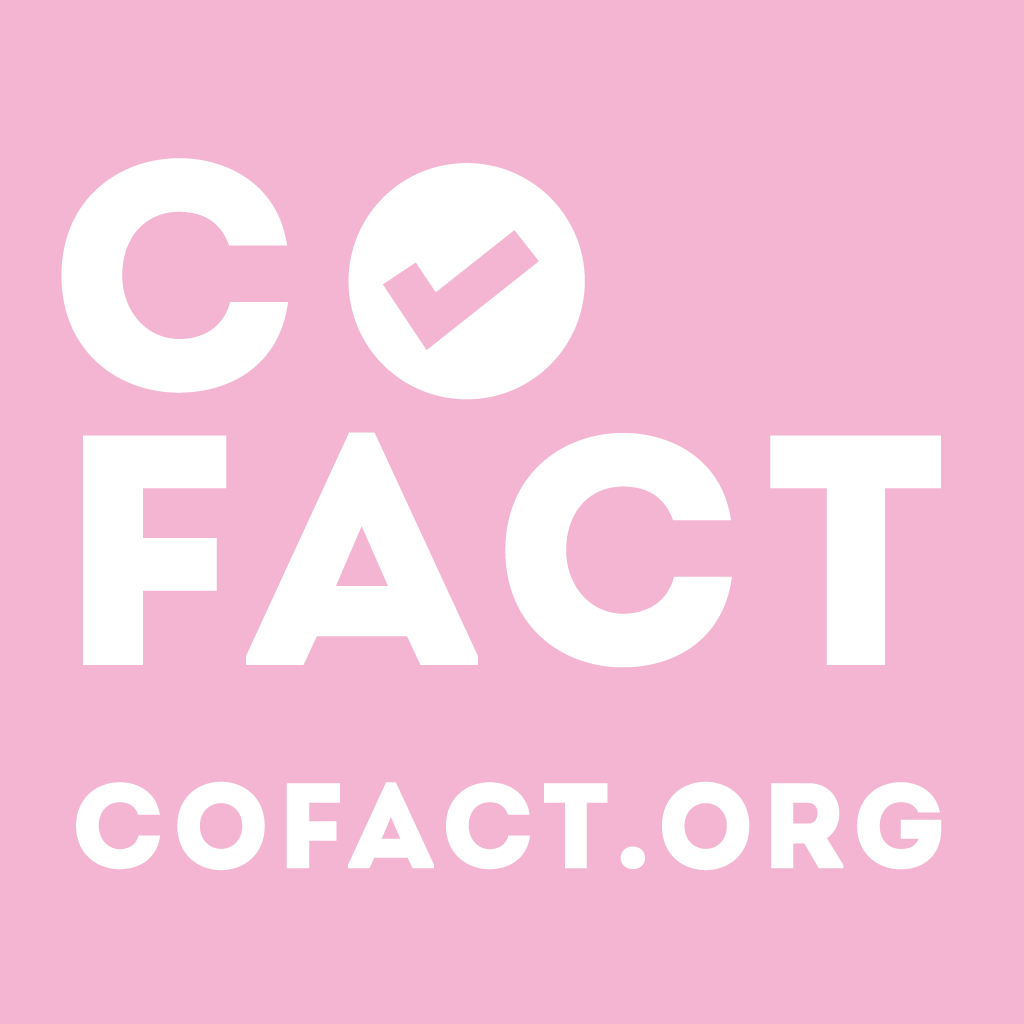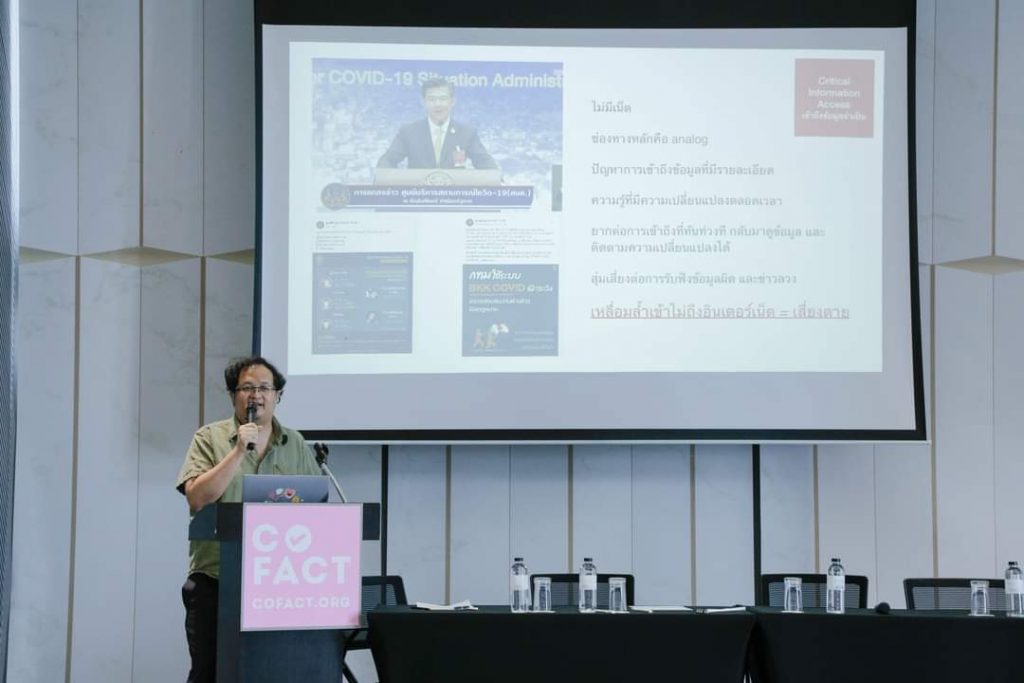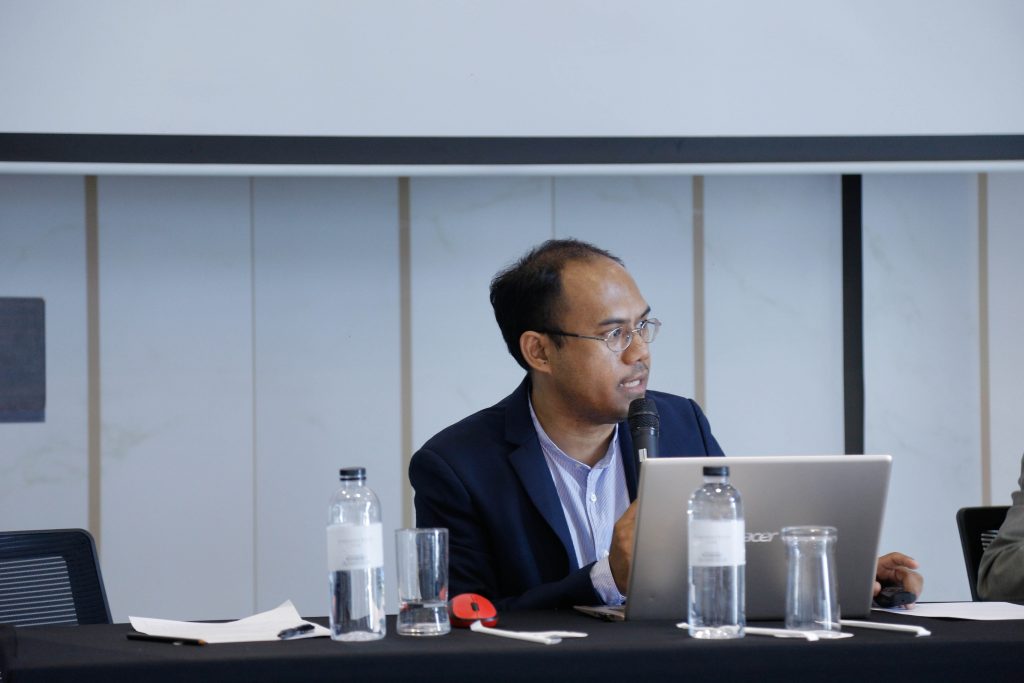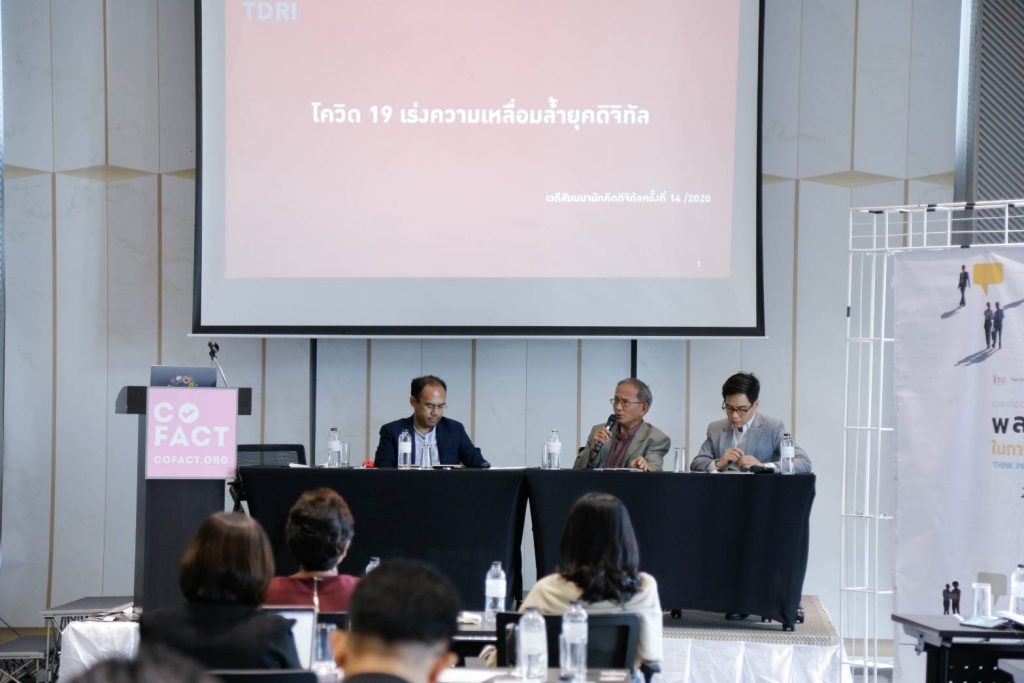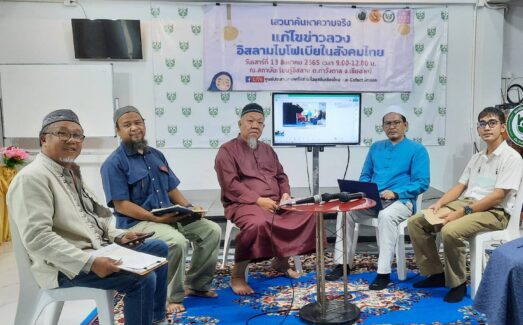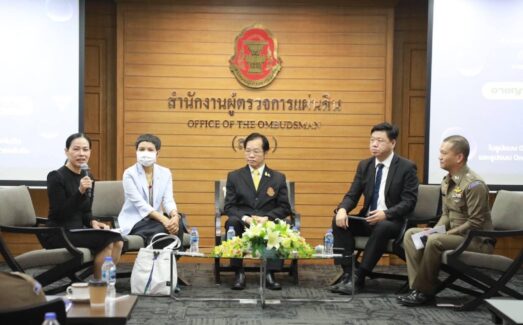COVID-19 ‘Missing (you) is missing’: Inequality in the Digital Era
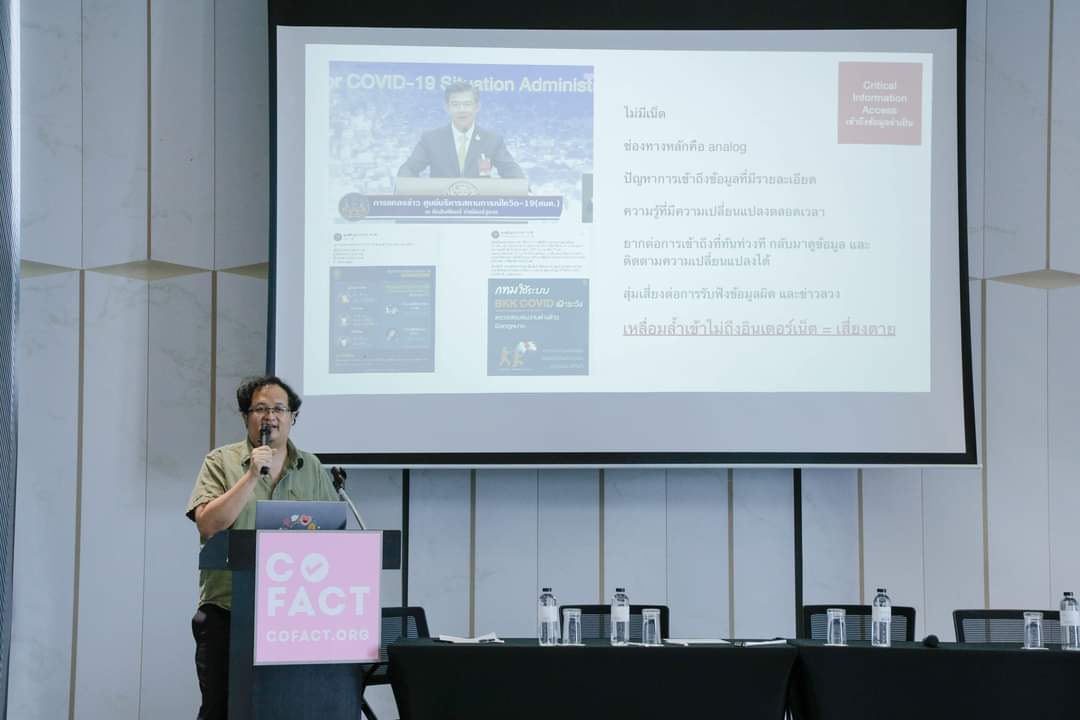
COVID-19 ‘Missing (you) is missing’: Inequality in the Digital Era
By COFACT Thailand
In light of COVID-19 crisis, access to internet connection becomes “the 5th basic needs” because everyone adheres to social distancing amid the new normal. Internet has become a shared space that connects every of us who stays home. It also serves as the government’s platform for citizens to register and receive financial aid. However, relief schemes remain an obstacle for those who “lack internet access”, especially vulnerable groups who are economically disadvantaged. The digital age, in fact, is leaving them more vulnerable to inequality.
Mr. Sunit Shrestha, Managing Director of the ChangeFusion Institute presented a paper titled: “COVID-19 ‘Missing (you) is missing’: Inequality in the Digital Era” to academics and experts convened at the 14th Year-end Digital Thinkers Forum co-organized by COFACT, Thai Health Promotion Foundation, Thailand Institute of Justice and Friedrich Naumann Foundation on 26 November 2020.
Mr. Sunit has summarized four dimensions of digital inequality which are shown below:
Dimension 1: inequality of internet access
Data about access to internet collected by state agencies are different. Lack of internet access can be assessed and according to the National Broadcasting and Telecommunications Commission (NBTC), at least 10 million Thai people still lack access to internet in 2019. Thailand’s population stands at 66.5 million, of whom 50.1 million have access to the internet. 16 million still lack internet access. The NBTC wrote on its webpage saying, the statistics doesn’t cover over 20 million people who are under the Pracharat Internet project (Government Nation-wide internet project). Meanwhile, according to statistics from the National Statistical Office (NSO) in 2018, the pool was conducted using a simple random sampling method on people aged over 6 who use digital tools, the survey found that 40% of them have never used the internet.
Lack of internet access has prevented vulnerable groups from receiving financial aid from the state. For example, Rao Mai Thing Kan (or “Nobody will be left behind” in Thai) that aims to allocate 5,000 baht per month for three months between April and June 2019. During the registration period, a large number of people had failed to register online. Dimension 2: Lack of internet access put people’s lives at risk During the first wave of COVID-19 swept across Thailand, lack of internet access put people’s lives at risk because they have no clue about preventive measures and the COVID-19 situation at different areas. A vast group of people don’t receive Covid-19 financial aid, vulnerable groups in particular.
If people can’t access website or Facebook Page of the Centre for COVID-19 Situation Administration (CCSA), they have to rely on news broadcast on mainstream media such as radio, television and newspaper that doesn’t come in real time.
Mr. Sunit said, “Information about COVID-19 is constantly changing because this is an emerging infectious disease. We still don’t know a lot of things. We don’t even know symptoms. Information about the disease keeps changing, for instance, the World Health Organization (WHO) spoke about wearing or not wearing a mask. During a fresh round of Covid-19 infections, the WHO recommended the global population not to wear a mask because the virus wasn’t dangerous and didn’t spread easily, but later urged people to wear it due to a change in information.”
This example reflects lack of internet access among people that later led to higher risk of infection. They also lack access to financial aid or donation because they don’t know types of aid and sources. Furthermore, vulnerable people tend to be at a higher risk of being tricked by the criminals like the case in which chao guay (grass jelly) seller (or shall we use street vendor?) had no idea about the amount of a crash handout and didn’t know how to withdraw money from an ATM. Some of his money were taken by the thief.
Dimension 3: Digital skills and fact-checking
Mr. Sunit stressed that lack of digital skills is reflected in fake news getting shared. Fortunately, no one in Thailand was dead because of coronavirus-related misinformation. Although digital tools are used in constructive ways, for example, running a page to promote local job vacancies or teach selling products online, it a causes higher possibility of sex trade and online gambling.
Dimension 4: Digital citizens and reduced inequality
Another inequality-related issue that increased during the COVID-19 outbreak during the past year is the government appears reluctant to share its information. For example, several inventors in Thailand developed mobile applications that are able to track the location of stores selling face masks, but due to lack of support from the government, the apps provided inaccurate information. Unlike Taiwan, the government fully supports the development of the application that can accurately track the stores’ locations and the amount of face masks available at each shop. Thus, having digital citizens in decision-making circle is necessary to help fix social problems and also allow public access to information as well as aids through different tools.
Ways to reduce inequality of the Thai government Another speaker is Mr. Tippatrai Saelawong, researcher at Thailand Development Research Institute (TDRI) who highlighted responses from Thai people to the coronavirus has been remarkably divisive.
“The yarning gaps of the so-called “Digital Divide”, which sill left unaddressed, has led to lack of educational and job opportunities. The divisiveness was amplified by the pandemic. For instance, when nationwide lockdown measures were enforced, a large number of people were left unemployed because they couldn’t work from home,” said Mr. Tippatrai.
“The government hasn’t paid much attention to e-government reforms. For example, policies that aim to help the poor fail to reach out to the target group because the government can’t find out all poor people. However, in every crisis there is opportunity, when the central government showed limits to the pandemic crisis, the local government officials had a chance to show their capacity through roles of village health volunteers and an installation of the “Pantries of Happiness”, known as tu pan sook. The roadside cupboards are seen as new innovation that helps people make ends meet during the pandemic crisis, the government can organize vast database of poor people more systemically. Good governance and database connection will bear fruit for the country.” Problems behind the three causes of inequality include out-of-date regulations, wealth inequality generated by the government itself, for example, power has been given to local authorities, but administration hasn’t really been decentralized. Also, the government ignores safety nets and often hands over financial aid, rather than making Thailand a “welfare state”. Good governance of digital government According to Prof. Surichai Wun’gaeo, professor at the Chulalongkorn University Social Research Institute (CUSRI), problems regarding inequality and good governance of digital government intensified amid doubts over whether information are stored for whom. Meanwhile, the government can’t yet find out which departments failed to do their jobs since each department kept saying they were facing budget constraints. Over the past years, Prof. Surichai said Thailand has been a highly centralized state. During the pandemic, the state controlled the suspected cases [of Covid-19] with the emergency decree. The country, however, witnessed a change that caused by the strength of civic groups. “The debate scope of digital citizenship must be extended beyond its pros and cons, or its true and false news. Rather than going against it, studies should be conducted on roles of emerging digital citizens. Civil society should be able to keep an eye out for public administration, good governance, treatment of the underprivileged, and other matters that don’t come from the central government’s press conference. Questions remain about how we can make reform of the government and other state agencies, whether by themselves or through cooperation, a national agenda,” he explained. The panel discussion highlighted that public access to information “seem” boundless in digital age, but in fact vulnerable groups of people can’t have internet access “equally”. Inequality manifested itself even before the COVID-19 but was unseen in a digital world. Thus, the only way to reduce inequality among Thai citizens and reach out to them to alleviate their hardship is to think though the inequality in a digital world.
